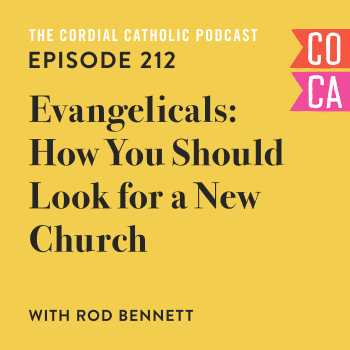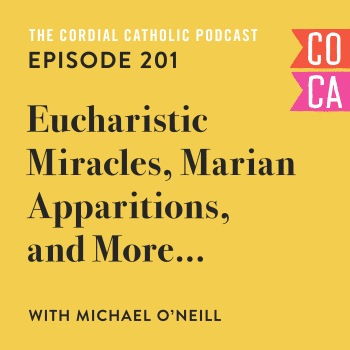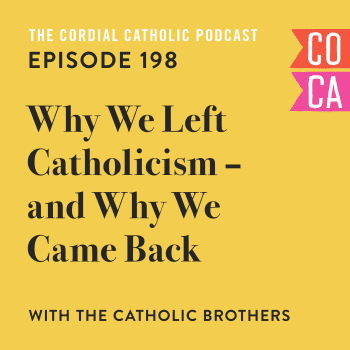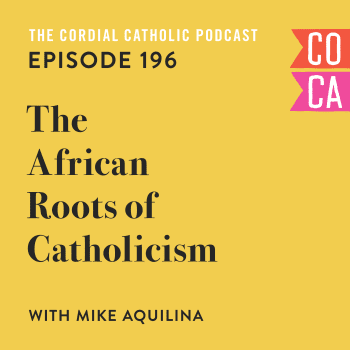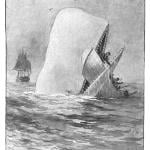
This article is part of the Tough Questions series. A series highlighting some of the difficult questions I was asking during my conversion from a non-denominational Christian to full communion with the Catholic Church. For more about my own conversion story, read What I Wish I Knew About Catholics (And Why I’m Becoming One).
As a non-denominational Protestant I knew nothing about the Catholic doctrine of the “Real Presence.” It was simply never on my radar. I understood, since my radical conversion to Christ at age fifteen, from the Protestant tradition I found myself in, that Communion was a symbolic celebration of Jesus’ life and death—something we tacked on to the end of a Sunday morning service about once a month.
I was shocked to find out that Communion—called, since ancient Christianity, the Eucharist—was something that Catholics did every week.
In fact, it was the focal point of the Catholic Sunday morning celebration.
And then I found out that they believe the bread and wine was actually and miraculously really Jesus’s flesh and blood.
Say what?
When my interest in Catholicism was first piqued by a Protestant pastor friend of mine I began to do a little cursory research. I found out pretty quickly that the Protestant sources of information on Catholicism were pretty sparse, and pretty lame. Many resources dealt in gross generalizations or were blatantly anti-Catholic, and so I began to look for Catholic sources to read. I wanted to find out what Catholics said about their own faith—and that was my first mistake.
As it turned out, many Catholics knew a lot about their faith—even if the ones I met seemed clueless.
It had been around, after all, for two thousand years and traced it’s lineage and practice, I learned, right back to the apostles. A lot had been written in that time, and so I had a lot to pick from. I began with contemporary source suggested on different lists around the internet and found that a lot of them referred to the Early Church Fathers.
In fact, it seemed like a lot of stable-minded, otherwise sane, non-denominational Christians like myself became Catholic after reading the writings of the Early Church.
I was curious.
The Early Church Fathers were Christian writers who wrote at the very beginning of the Church. Often they were disciples of the apostles or removed by only a generation or two. Polycarp, for example, one of the earliest sources, was a disciple of John and his letter to the Church at Philippi was read as Scripture in Philippi along with Paul’s letters which were eventually adopted into the New Testament canon. These Early Church Fathers were often bishops, appointed successors to the apostles, and wrote in the same way which we see the apostles writing in the New Testament epistles—authoritative letters and notes to churches who were struggling to uphold Christian teachings.
As I began reading through the Early Church Fathers I was struck by how Catholic they sounded and I began to discern some pretty tough questions. Namely, this ridiculous idea of Jesus’s “real presence” in the celebration of the Eucharist.
Ignatius of Antioch, a disciple of John, was born around AD 50 and writes about a sect of heretical Christians like this,
You have noted those who teach heterodox things about the grace of Jesus Christ which came to us. How they are contrary to the mind of God! They are not concerned about love, neither the widow, the orphan, the afflicted—whether bound or free, the hungry nor the thirsty. They abstain from the Eucharist and from [set times of] prayer because they do not confess that the Eucharist is the flesh of our Savior Jesus Christ, that flesh which suffered for our sins but which the Father raised in his kindness.
Notice how Ignatius identifies these Christians as not believing and practicing the true faith of the Early Church: They aren’t concerned about love, widows, orphans, the poor, and don’t believe that the Eucharist is “the flesh of our Savior Jesus Christ.”
On his short list of things that make this group not Christians he identifies, clearly, unbelief in the Eucharist as the actual flesh of Jesus.
Justin Martyr, a Christian convert writing around AD 130-160, describes a Eucharistic celebration in the Early Church which sounds nearly identical to what Paul describes in his letter to the Corinthians,
We call this food Eucharist, and no one else is permitted to partake of it, except one who believes our teaching to be true and who has been washed in the washing which is for the remission of sins and for regeneration [i.e., has received baptism] and is thereby living as Christ enjoined. For not as common bread nor common drink do we receive these; but since Jesus Christ our Savior was made incarnate by the word of God and had both flesh and blood for our salvation, so too, as we have been taught, the food which has been made into the Eucharist by the Eucharistic prayer set down by him, and by the change of which our blood and flesh is nurtured, is both the flesh and the blood of that incarnated Jesus.
Justin Martyr writes that just as Jesus was made flesh and blood “as we have been taught, the food… is both the flesh and blood of that incarnated Jesus.”
It couldn’t be more clear.
I realized it came back to the Bible.
In John 6, after a miraculous multiplication of bread and fish, Jesus tells his disciples, the many thousands listening, that they must “eat [his] flesh.” The crowd scoffs. Of course, to imply his good Jewish disciples should eat his flesh was tantamount to murder—and disgusting to the law-abiding Jew—so many cry out in disbelief. And what does Jesus do? He repeats himself, just so his message is clear. In the original Greek he opts for an even stronger word to make his point, telling his followers they must “gnaw [his] flesh.” It’s pretty graphic. So graphic, and difficult to hear, in fact, that many of his followers leave. They’ve had enough.
And Jesus doesn’t stop them. In fact when the disciples approach asking Jesus for clarification he tells them that, yes, it is a difficult teaching and asks if they want to leave too?
As a non-denominational Christian who loved my Bible I’d probably read this passage dozens of times but somehow missed it. Jesus is speaking quite clearly but we’d always assumed it wasn’t literal. It couldn’t be, after all, because who believed that we needed to eat his actual flesh?
That was crazy-making.
But this, I found out, was exactly what Catholics believed, for two thousand uninterrupted years.
And this was what the Early Church Fathers talked about, too.
And even earlier than that.
Jesus, at the Last Supper, which forms our understanding of Communion across all Christian denominations again talks about his flesh and blood—there is nothing to suggest he means it figuratively although as non-denominational Christians we simply read it that way.
Later, in the epistles of Paul, we see him referring again to the Lord’s Supper as Jesus’s “flesh” imploring the Corinthian church to “discern the body” before eating or else fall into grave sin.
Discern the body? Was Paul saying that Christians in Corinth needed to recognize what Jesus said—that it wasn’t simply bread and wine in a solemn celebration—before taking Communion? It certainly seemed that way, especially in the context of a letter to a group of believers who were using the Lord’s Supper as a means to eat excessively and carelessly—treating it like another everyday meal instead of a partaking in “the body” of Jesus.
In fact, if we look back at Justin Martyr, writing a generation or two after Paul, he mentions that “no one else is permitted” to take part in the Eucharist unless they “believe our teaching to be true.” This sounds an an awful lot like what Paul warns the Corinthians about—that they must “discern the body” before partaking.
As I read Catholic sources, as I re-read my Bible with a more discerning lens, and as I read from the Early Church Fathers I began to have a sneaking suspicion that maybe I’d been doing something wrong. Was I applying some kind of selective interpreting of the Scriptures? Why was Jesus speaking figuratively here and not there; why were Paul’s words literal about one thing and metaphorical about another?
The more I read, and read more closely, I was faced with a very tough question: Did the Catholic Church get it right about what Jesus meant when he said we had to eat his flesh?
Was he speaking literally?
Was the ancient Church concept of the “Real Presence” … real?
In the history of Christianity, I found, it was unmistakable.
For 1,500 years the Church had believed that Jesus was “really present” in the Eucharist. That Communion wasn’t merely a symbolic celebration but Christ coming to actually dwell amongst his people in a miraculous way. Even if we don’t take Christ at his literal word on John 6 or at the last Supper and even if we ignore Paul’s very literal charge to the Corinthians the witness of the Early Church Fathers is unambiguous (and I only quoted two).
Then from Augustine to Athanasius to Thomas Aquinas and up to the Protestant Reformation the chain of belief is clear and concise. Jesus is really present in the Eucharist not merely symbolic.
The break, then, and why my own non-denominational tradition taught me nothing of the “Real Presence” happened slowly following the Protestant Reformation. Christian denominations that decided to make a clear break from what had been traditionally believed for 1,500 years began to spring up, and spring up, and spring up. And these denominations, down through the centuries, are where my faith traditions came from. Removed from the long line of church history—from 1,500 years of continuous belief—I was taught that Communion was a symbol.
And faced with a very tough question.
What if Jesus was speaking literal? What if Paul was too? What if the Early Church, who clearly interpreted things this way, was right?
(What if they were wrong and did that even make sense? Because I had to believe that, didn’t I? That they got it wrong? The disciples of the apostles?)
It was a tough question to ask, and even more difficult to answer. Because if I decided to side with history it meant that I had been wrong—and Catholics were right. And then, should I become Catholic? Didn’t I want the most full experience of the Christian faith as Christ intended it? That the Eucharist wasn’t merely a symbolic memorial with bread and wine but a memorial sacrifice where Christ became truly present?
Could I settle for less, when Jesus seemed to offer more?
Ultimately, I found myself having to answer in the same way which the apostles did way back in John 6. When Christ said his actual flesh must be eaten, when he prefigured the Last Supper and so many walked away, his disciples grumbled about the difficult teaching. Are you going to leave too? Jesus asks. To whom will can go? They reply.
To whom else could I go?



